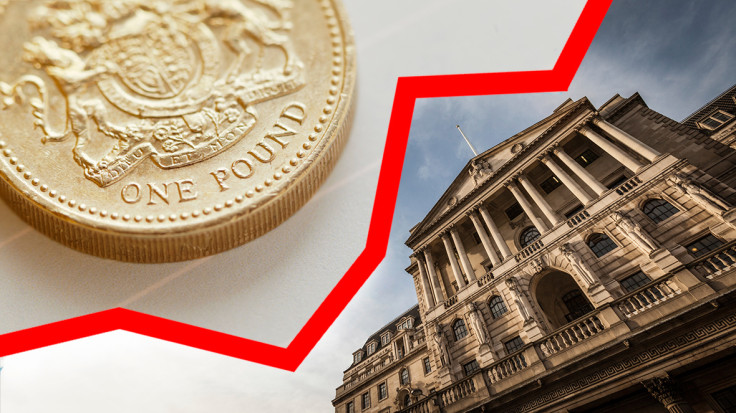Pound hits one-year high against US dollar after Bank of England paves way for November rate hike
BoE votes 7-2 in favour of keeping interest rates unchanged but signals monetary policy could soon be tightened.

The pound hit a one-year high against the US dollar on Thursday (14 September), after the Bank of England (BoE) held the UK's benchmark interest rate at 0.25%. However, the BoE indicated it could tighten its monetary policy over the coming months.
At 1.40pm BST, sterling was trading at $1.3337, the highest level against the greenback in a year after gaining over a cent against the US currency. However, the pound is still 11% lower than it was before the June 2016 EU referendum.
The pound was also 0.89% higher against the euro, fetching €1.1210.
"With the central bank stating that it could 'reduce stimulus in the coming months' if inflationary pressures continue to mount, sterling is likely to remain supported this week," said FXTM research analyst Lukman Otunuga.
"From a technical standpoint, the pound/dollar rate bulls have won the battle this week, as the currency trades to a fresh yearly high above $1.3320. Prices are bullish on the daily charts, with today's hawkish boost by the BoE likely to support a further incline towards $1.3400."
The rally came as members of the BoE's Monetary Policy Commitee (MPC) voted 7-2 in favour of keeping interest rates unchanged at a historic low 0.25%, but signalled monetary policy could be tightened over the coming months, unless there was a sudden string of bad economic data.
"If the economy follows a path broadly consistent with the August Inflation Report central projection, then monetary policy could need to be tightened by a somewhat greater extent over the forecast period than current market expectations," the MPC said.
The pound initially dropped as traders, who were anticipating at least one more vote in favour of a rate hike which would have represented a potential shift of power within the MPC, were left disappointed after the split remained 7-2 in favour.
However, the tone of the minutes immediately halted sterling's decline, triggering a sharp move upward.
"The question now is how far can the pound go," said Oanda's senior market analyst Craig Erlam. "The next test against the dollar is $1.35, a break of which would be very surprising as it would signal a move back towards the kind of levels we were seeing prior to the Brexit vote.
"Against the euro, we've broken back below 0.90p and currently trade below 0.89p and so the next test below could come around 0.8850p and below that."
November hike on the cards
Analysts interpreted the MPC statement as a clear indication a first rate hike in 10 years could come as soon as November.
"The prospect of a November rate hike is now a real possibility in our view," said Kathleen Brooks, research director at City Index.
"We tend to assume that the BoE will make any major move at a meeting when the Governor presents the Inflation Report, which leaves November or February. Surely, if inflation is rising and the labour market continues to create jobs at its current clip then November could be key."
Paul Hollingsworth, UK economist at Capital Economics, added the minutes struck a considerably more hawkish tone than in August, which could pave the way for a rate increase before the end of the year.
"This supports our long-held view that market expectations had gone way too far in expecting rates to remain on hold until 2019," he said.
"If the economy continues to hold up, and there are clearer signs that wage growth is building, then the first hike could come somewhat earlier than we had previously envisaged, possibly as soon as the next meeting in November."
Meanwhile, Andrew Sentance, senior economic adviser at PwC argued that while the latest decision from the MPC was not a surprise, some very strong arguments for a rate rise - such as rising inflation, sterling weakness, falling unemployment - have been in place for some time.
"The challenge facing the MPC is to deliver a gradual increase in interest rates which can be absorbed by the economy," he said.
"By continually delaying the first move in this direction, there is an increasing risk that when interest rates do start to rise, it will take consumers and borrowers by surprise - and therefore create a bigger shock to the economy than it needs to be."
© Copyright IBTimes 2024. All rights reserved.






